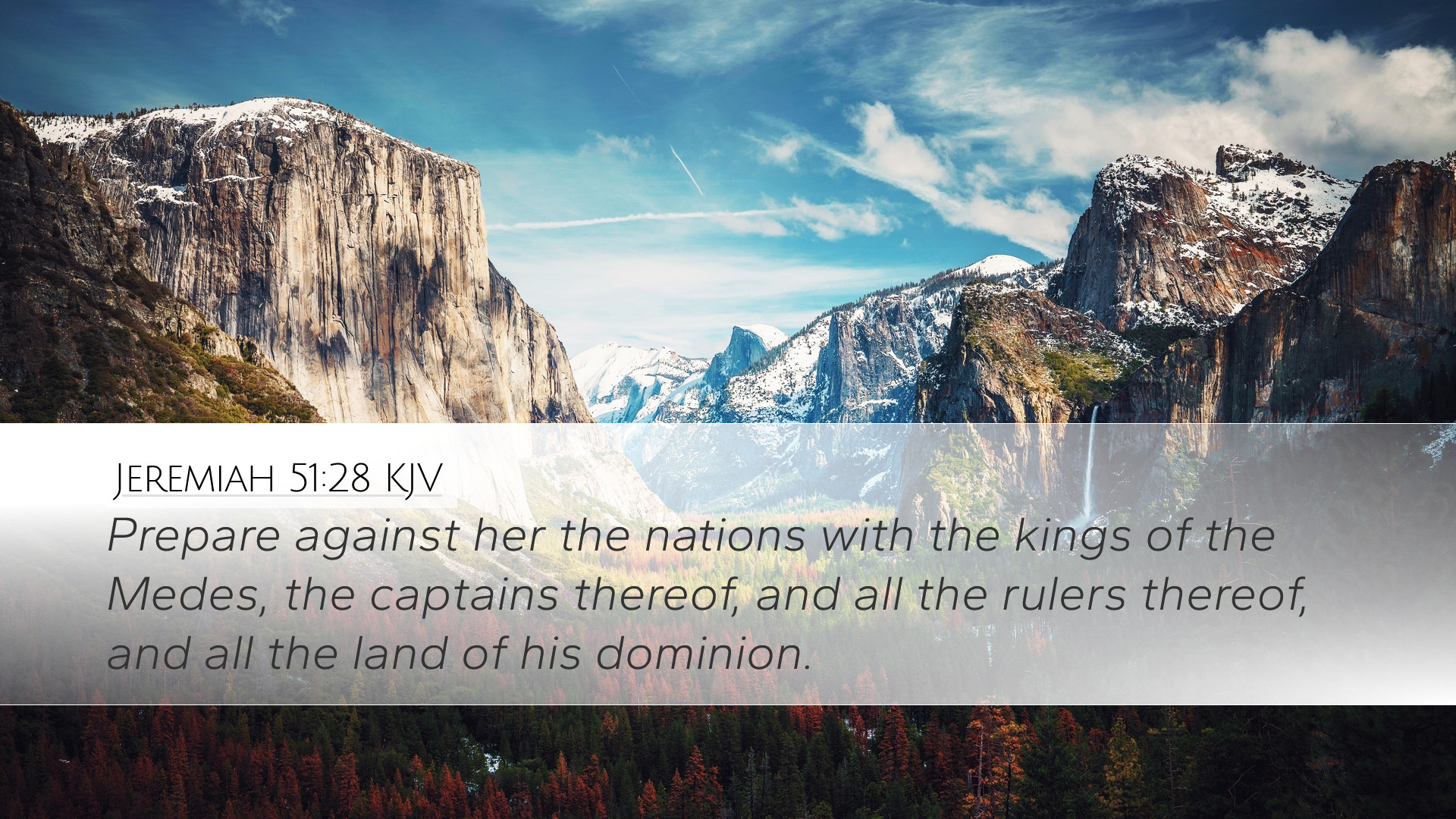Commentary on Jeremiah 51:28
Bible Verse: "Prepare the nations against her, the kings of the Medes, the captains thereof, and all the rulers thereof, and all the land of his dominion."
Introduction
This verse forms part of a prophecy concerning Babylon's impending doom, a theme extensively woven throughout the Book of Jeremiah. It highlights God's judgment upon a nation that has become the epitome of pride and rebellion against Him. This commentary integrates insights from renowned public domain commentaries, providing depth and context to understanding this prophetic cry.
Historical Context
The prophecy against Babylon comes at a time when the Israelites were soon to face devastation at the hands of their Babylonian captors. Jeremiah proclaims a message of judgment, urging the attention of nations—particularly the Medes—who would play an instrumental role in Babylon's downfall.
Babylon’s Significance
Babylon, known for its grandeur and might, symbolizes human pride and rebellion. Matthew Henry reflects on Babylon as a representation of a sinful world, drawing attention to its eventual subjugation under divine justice.
The Medes' Role
Jeremiah’s declaration about the Medes conveys not only their military might but also God’s sovereign planning in raising up nations to execute judgment. Albert Barnes emphasizes the divine orchestration behind historical events, asserting that God prepares nations for specific purposes in accordance with His will.
Theological Implications
This verse opens up numerous theological dialogues surrounding divine sovereignty, judgment, and the interplay of earthly powers. It serves as a testament to the framework within which God utilizes nations to fulfill His redemptive plan for humanity.
Divine Sovereignty
God’s sovereignty is a dominant theme in this prophecy. Adam Clarke notes that the appointment of the Medes as instruments of judgment demonstrates God’s control over all nations, suggesting He can use even the most unlikely agents to accomplish His purposes.
Human Rebellion and Divine Justice
The fall of Babylon signifies the destiny of all nations that rebel against God. Matthew Henry asserts that the pride and corruption of nations ultimately lead to their destruction. This serves as a sobering reminder to contemporary societies regarding the consequences of turning away from divine directives.
Practical Applications
For pastors, theologians, and students of the Bible, Jeremiah 51:28 invites reflection on present-day parallels to Babylon’s pride. It encourages an examination of personal and national righteousness in light of God's justice.
Call to Righteousness
The call for the preparation of nations can be seen as a directive for spiritual vigilance. The people of God are called to respond righteously amidst societal decay. Albert Barnes suggests that today’s believers must prepare themselves and their communities to stand against the tides of moral and spiritual upheaval.
The Role of Prayer
In the context of judgment, prayer emerges as a vital response. Adam Clarke emphasizes the importance of intercession for nations, reflecting a heart aligned with God's will. Pastors and church leaders should encourage congregants to be active in prayer, not merely for oneself but for the nations, echoing Jeremiah's heart for his people.
Conclusion
Jeremiah 51:28 serves as a poignant reminder of God's sovereignty, the reality of His judgment, and the ongoing relevance of prophetic voices in a wayward world. Through the insights of esteemed commentators, we are invited to draw wisdom from this text, illuminating our understanding of divine justice, accountability, and the necessity for holy living.
Reflection Questions
- What relevance does the judgment of nations hold for contemporary societies?
- How can we, as believers, engage in intercession for our nations?
- In what areas of our lives might we be exhibiting Babylonian pride and how can we seek transformation?


